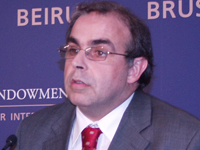Registration
You will receive an email confirming your registration.
Pakistan’s fragile civilian government must ensure that the near-term challenge of fighting extremists in the Northwest Frontier Province and elsewhere does not undermine the long-term need to reform its intelligence agencies. The manipulation of domestic politics by intelligence agencies actively weakens the state. Their role must be redefined if Pakistan’s democratic transition is to succeed.
Frederic Grare debated Robert Boggs of the NESA Center on the rationale for reform of Pakistan’s intelligence agencies, and how best to begin that effort. Carnegie’s Ashley J. Tellis moderated the event.
ISI’s Proxy War
The intelligence agencies are responsible for Pakistan’s deteriorating security situation, Grare argued. The agencies, including Inter-services Intelligence (ISI), are engaged in a proxy war against Pakistani citizens. They create political factions and play them off each other to influence domestic politics to their advantage; intelligence agencies have maneuvered behind the scenes to prevent the election of governments that seek to reduce their role, and have an interest in perpetuating the conditions that justify their existence. As the proxies ISI creates multiply, it becomes progressively harder to manage the country’s political and security situation.
Grare also emphasized that the intelligence agencies’ brutal tactics have made violence an acceptable way of managing political and social problems and have undermined the state’s monopoly on the use of force, a key pillar of legitimacy. Regaining that legitimacy by reforming the intelligence agencies and re-asserting civilian control is crucial to preserving democratic civilian governance in Pakistan.
Policy Recommendations:
- Clarify the intelligence agencies’ mission. Intelligence reform will require not only changes in the state, but in the state of mind of key actors.
- Restore the Supreme Court, and reinstate Chief Justice Iftikhar Chaudhry, who has attempted to rein in the intelligence agencies in the past. Insulate the judiciary from further political meddling.
- Prosecute ISI legal violations to make clear that intelligence professionals are not above the law.
- Strengthen the police force. Some of the counterterrorism work currently done by intelligence agencies is the natural province of police.
- The international community should work through the civilian government. Maintaining separate relationships with the intelligence agencies undermines Pakistani democracy.
“A Clear and Present Danger”
Boggs quoted slain former prime minister Benazir Bhutto, who argued that violent Islamic extremists posed an existential threat to Pakistan. Closer civil-military-intelligence cooperation is needed to prevent militant violence from spreading throughout the country, Boggs argued. But reforming the intelligence agencies could provoke a debilitating confrontation between the civilian government and the military. Pakistan should focus on eliminating the threat of extremism before undertaking potentially destabilizing reform.
Greater civil-military cooperation does not preclude intelligence reform, Grare noted, and pursuing near-term objectives without regard to long-term ones feeds the cycle of instability in the country. Clarifying the intelligence agencies’ mission and relationship to the military could actually aid in counter-terrorism operations, by giving the civilian government (and Western governments who cooperate with Pakistan in the war on terror) a clearer idea of what kind of partner they have.
